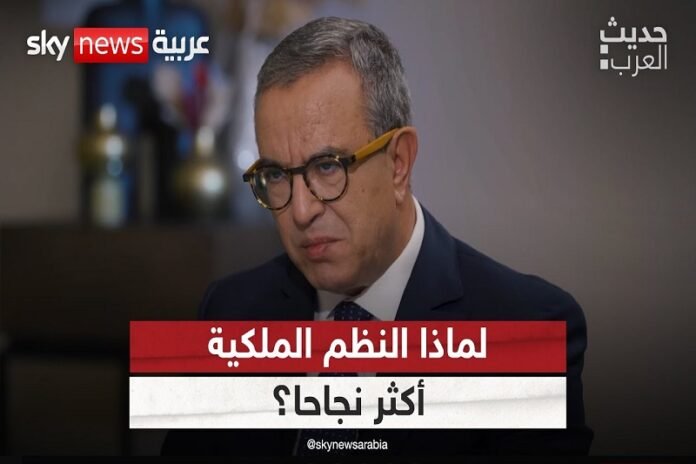In an Arab moment marked by the erosion of nation-state legitimacy and the disintegration of classical republics, Moroccan minister and human rights advocate Mohamed Oujjar appeared on Sky News Arabia’s “Hadith Al-Arab” to open one of the region’s most sensitive debates: Are monarchies more resilient in times of crisis? Do they better guarantee continuity amid political breakdowns?
Post-Republics: Monarchical Dream or Absence of Alternatives?
According to Oujjar, monarchies in the Arab world have not only survived but are increasingly seen by elites and ordinary citizens as rational alternatives—not because they are perfect systems, but because they offer relative order amidst chaos.
His analysis is not romanticized but grounded in observable facts: collapsing republics torn apart by violence and coups, unable to provide the minimum political and social rights.
Yet the fundamental questions remain:
- Is monarchical survival due only to religious and historical legitimacy?
- Or is their strength rooted in adaptability and openness to reform?
Morocco: The Accumulated Exception
In Morocco’s case, Oujjar highlights how the monarchy has accumulated multiple forms of legitimacy: historical, religious, national liberation, and later, political and social performance.
This accumulation, however, coincides with the weakening of political parties and intermediary institutions, leaving the monarchy as the primary stabilizer of state and society.
Hollow Republics and Lost Horizons
Going beyond defense of monarchy, Oujjar critiques republics that have morphed into hereditary regimes, failing to modernize the state or develop new political elites.
Who holds these systems accountable? Where are the mechanisms that once created political awareness—unions, parties, universities?
Crisis of Representation or Cultural Deficiency?
Oujjar diagnoses a dual crisis: political elites unable to generate meaning or solutions, and a disillusioned public.
Social media fills the void—but without vision or leadership.
The risk: intellectual and cultural alternatives have not emerged to replace failed party structures.
Who Shapes Public Opinion in the Age of Platforms?
One of Oujjar’s key warnings is about the retreat of intellectuals from public discourse, leaving the field to influencers and “fast opinions.”
- Can democracy reform itself without thinkers?
- Can monarchy substitute for a broken intellectual and political order?
Reforming Monarchies or Exploiting Disorder?
While defending monarchies, Oujjar stresses the need for continuous modernization to address digital, generational, and social challenges.
Legitimacy, he notes, must be earned daily through listening and performance.
Conclusion: Monarchy as a Framework for Rethinking Statehood
Oujjar does not glorify monarchies but urges us to think seriously about systems that can adapt, stabilize, and restore faith in the state as a guardian of rights and dignity.
The real question is no longer monarchy vs. republic. It is: what kind of governance ensures the survival of the state itself?


